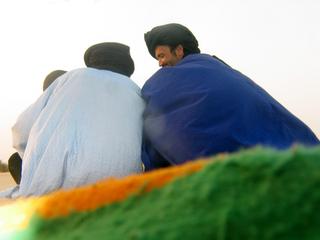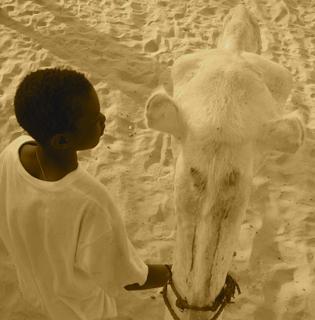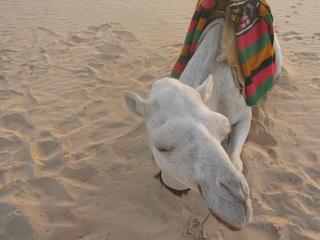Lost in the desert



So, Timbuktu. Predictably disappointing, I suppose. I had a good interview at the tourist office, a plain grey brick building with a couple posters on the dirty orange walls. No racks of brochures or maps here, in fact, the only map of Timbuktu was a faded surveyor’s map, anonymously depicting every mudbrick building in the city. There were brochures, they’re just kept in the manager’s office. No computers, not even a fan in a country where temperatures can soar to 45 c. The sole telephone line snakes into the main room, although it doesn’t ring often. When it does, it’s a tourist wanting to know if Timbuktu has hotels and blankets. The main employee, Baba, told me it’s definitely boring, that sometimes an entire week can go by without a tourist and that even when they do arrive, it’s usually just to get a souvenir stamp in their passport. So he had plenty of time to talk and told me over African tea and a cigarette that Timbuktu is so mysterious because it has a history of miraculous, unexplainable phenomenon, like fighting off the French even though Tombuctiens didn’t have guns. About the Marabout who kept the sun dangling in the sky over Djenne so he could save an errant son who had offended the elders at the mosque. The city has 333 saints, 15 of them women, and all of them have done something awe-inspiring at some point.
Baba, the captain of the local basketball team, told me they have about 4,000 to 5,000 people go through the office every year and it’s his job to keep meticulous count of the tourists and their hotels before stamping their passports. It’s an important industry, he said, as it has a trickle-down effect for the city’s families.
I wandered back to the hotel feeling in much better spirits and found more people said hello or smiled when I was on my own. At the hotel, Gilles was camped out with a book and Moctar and Rosaire were still out. Gilles and I had a nice enough chat about things, but I still think he thinks I’m square, while I think he’s a moody old man. Sweet, but ornery.
At 5.30 p.m., we walked out behind the hotel and onto three waiting camels. It was lovely and I really thought I could do it for days – maybe the 53 days it takes to get to Morocco. We were only riding for maybe an hour and my camel and I worked out a system where he would throw his head back, I would scratch behind his ears and he would keep plodding along. His name was something like Aurwa, a strange name for a boy and one that didn’t mean anything. The saddle, with two tall bookends at either end, was actually quite comfy and the rocking motion was somewhat soothing, a greatly pronounced version of riding a horse. Working up and down the dunes made the flaps make sense. And when we arrived at the “village” – a collection of three huts – they dropped rather suddenly and curled up like cats. I really want one.
I snapped a few photos of the Tuaregs who came out to sell Gilles and Rosaire some jewelry and then promptly took off. I swear, if Gilles wasn’t such a character, they would have spent about five minutes with us and left a very bad impression. As it was, all they had to say about being Tuareg is that they prize three things above alleles: stars (which help them move through the unchanging desert), camels (which move them through the desert) and liberty (which allows them to move through the desert.) I have to admit, I was a bit enchanted by the three men – two brothers and their Arab brother-in-law – as well as their father. There were a gaggle of children around, some dirtier than others and one stark naked, and they were well loved. When the men came in, they scooped up the children and played for a few minutes while prayer mats and blankets were stretched out for us. Out of the sand came dozens of scarabs, big black beetles which scared the heck out of me, but apparently don’t pinch or bite like they do on television. The only downside, frankly, was a little child who worked for the Tuaregs but clearly didn’t belong. He demanded a little gift, which I refused, then wanted a pen, a book, and old shirt. Gilles promised him a dirty T-shirt, and not two minutes later, he was pestering me. I found that off-putting. But the other little guy was a charmer. When we sat down on the prayer mats, I took off my shoes, as is tradition, and within minutes I could hear him making little car noises. He was racing my sandals, vroom-vrooming as they turned the corners. At one point, my left shoe disappeared. It was found tucked under something inside the hut, to play with later on.
We had a “traditional” dinner of toucasse ate with our hands from a communal bowl. It was basically dough balls with tomato sauce and meat and I would regret it with a vengeance.
The sun dropped like a stone as usual and the moon came out bright as a beam. As soon as dinner was cleared away, Gilles stretched out and Rosaire began his rather fuss-budgety bedtime routine, which I found rather amusing, considering we were in the desert. It was barely 7.30 p.m. Moctar talked for a few minutes about the stars, then we really got talking over African tea and after a while, I realized Rosaire and Gilles were still awake and listening as I asked Moctar how he became a guide and he told me his father never let him go to school, but he used to follow his friends every day and eventually he just started going, although it took the teacher a while to realize he had an interloper in the classroom. When he was found out, he was sent to the principal’s office, where he was told he could join the class and even given supplies. Now in school, his father refused to pay for things like pens or paper or crayons, so Moctar took to standing outside hotels and asking tourists, “Donnez-moi un Bic?” (You were one of those kids! I yelled.) And pretty soon, they were giving him things beyond paper and pens, like cash and clothes. And pretty soon, a couple asked Moctar to lead them overnight to another village, and they would pay him. He readily agreed, although he slunk home fearing his father would beat him for not coming home for two days. The couple ended up dashing him a pair of running shoes, which he presented to his father upon arrival. It seemed to smooth things over and Moctar’s been guiding ever since. In the off months, he runs a “cabine telephone” and has cows and goats. I guess he’s got six brothers and sisters to support, so he does what he can. He told me he arranges parties, fetes and weddings and is listed in the guidebook as a good guy to know if you’re looking for a good time. That led to a discussion of his own wedding, as we’d all me this fiancée (by this time I was seriously wondering what the boys had talked about, if anything at all, before I arrived.) He said he wasn’t sure when it would happen, as both he and his bride are puehl and they have huge, showy 7-day weddings with feasts for 30-100 people every day and they’re expected to host out of town friends and family. They’re also expected to pay a huge dowry, as well as all the jewelry, which is legion for everyday wear and simply spectacular for weddings, as well as dozens of new outfits and shoes. He said his people are probably the most racist, believing they’re superior to other ethnic tribes and never referring to themselves as black. They allow intermarriage, but don’t encourage it unless it’s with a white man or woman.
He told us the tradition is that it’s the third day of the wedding before the couple is finally allowed to be together, but even then tan old woman’s in the room to witness the consummation of marriage vows and will even collect a bloody blanket so the family can display it like a flag as a sign of their daughter’s upbringing. (That doesn’t happen much anymore, he said, as most girls start having sex around 13 years old.)
Then he told us a long, long story about Djenne, which I only caught parts of, because I was daydreaming and trying to translate at the same time.
About 9.30 p.m., the boys grew quiet and stretched out for bed, while I heard drums in the distance and Moctar suggested we go check it out, as it couldn’t be more than 2-km away and would probably last until midnight. Wrong. About two minutes into our walk, the drums stopped and 10 minutes later they hadn’t restarted, so we turned around. Moctar, however, suggested we sit for a while. I just smiled, thinking this leg of the trip had become like Lolita’s Lust, a Canadian girls’ amorous adventure through Africa. Except it was more about fending off amorous adventures than engaging in them. Moctar was cute but I wasn’t really interested and told him so, repeatedly moving his hand from my thigh. Eventually, with the moon gone and the wind picking up, I suggested we get moving.
Now, the desert at night looks as barren as the day, but in the dark its even more difficult to distinguish rocks from trees from mud huts. They’re all just shapes. So we started walking and about five minutes in, I began to wonder. Our footprints weren’t where we were walking and nothing looked or felt similar or familiar. Ten minutes later, Moctar was sweeping the ground with the flashlight looking for familiar signs. We walked and walked and walked – I fought every urge to look at my watch – and eventually came to a collection of huts where Moctar woke the woman to ask for directions while I walked over to a tree to pee, realizing after a donkey was standing there silently, but hey, I figure he sees asses every day.
Moctar came out and we continued walking but I felt we were moving in the wrong direction, mostly because the airport light was all wrong compared to how it looked from our sleeping mats. Sure enough, we passed a well and while we passed a well on our way into the camp, I thought it was different looking. Then we passed some huge-looking structures and when Moctar asked if we passed those, I said no. He went inside again to ask and I started to think about how one gives directions in the desert, how Moktar was even describing where we were going. I mean, the joy of being a nomad is that you don’t have to get to know your neighbours, because you’re just going to move again in a couple months.
Two pickers, a thorn, a nasty tangle with a thorn bush and a truly terrifying encounter with an angry dog, I was starting to really worry, although I figured we weren’t really that far off and maybe by light we’d have a better sense of our bearings. I was loathe to just lay down, though. We walked in the deep sand that makes the road for a while until we came to another hut, where Moctar waited for the man to emerge and lead us home. I jumped a foot in the air when I heard rustling and pictured a rabid dog bursting out to bite us. It was merely a sheep as upset as I was to be standing there.
When the man came out he was bleary eyed, but had on his “walking shoes,” rubber thongs worn to wafer thinness. He had more grey whiskers on his chin then hair on his head, but after a brief discussion with Moctar he took off, walking with the easy, measured steps of a man who knows his way so well, he’s no longer even thinking about it. I would have followed him to the end of the earth and this being the outskirts of Timbuktu, that was pretty much what I was doing.
Within 10 minutes, there were the familiar lumps of Giles and Rosaire sleeping in the sand. I laid out on the sand and quickly realized this was going to be a long, long night as sand starts as stone and is only marginally more comfortable. The wind picked up immediately and was freezing, about the coldest night I’ve had since the snow in Morocco. And there’s just no sleep to be had when you’re surrounded by men who snore – one like he’s calling the dead – and there was a little boy who fell asleep face down in the sand who would rise periodically amid great grunting and snorting in what I can only imagine is a Tuareg sinus clearing technique. Around 4 a.m., along with the calls to prayer, Rosaire let loose with some great farts. Lovely.
At 5.30 a.m., the “quat quat” arrived to start the trek back. Within five minutes of riding in the car, I felt horribly sick and only just managed to get to the bathroom at our breakfast spot before I exploded. Until it happened, I wasn’t sure which end it was going to come out of. The boys ate while I had a cup of hot water, then we climbed in and began the bumpy ride to Douentza, my stomach doing flip flops the whole way. I started to eye up trees and branches and about 10 minutes from Douentza, I tapped Moctar and said “arret! arret!” and somehow the driver managed to slow down immediately and I took one step from the truck and threw up seven times, first pink from my Pepto, then the clear liquid of the water I’d been drinking and then finally, yellow. Who knows where that came from.
Feeling rather sheepish, I climbed back in the truck and actually started to feel marginally better. Moctar decided I should go to the campement for a repose instead of catching a bus to Gao and I agreed. I spent the afternoon stretched out on a matla in the courtyard of the campement as Dogon hikers came and went. Most were incredibly sympathetic, offering medication and probably silently thanking their respective gods that they weren’t me. By late afternoon, I started to feel marginally better and swallowed peanuts and another Pepto. Then barman came by to ask if I would take some lemongrass tea. It went down pretty smoothly, but I decided to stay put for the night and catch the next day’s bus. I had a shower, then threw up another five times, cursing the lemongrass tea. I headed off to bed at about 7 p.m., after getting advice from a German guy traveling alone and woke this morning seriously dehydrated but feeling markedly better.

0 Comments:
Post a Comment
<< Home